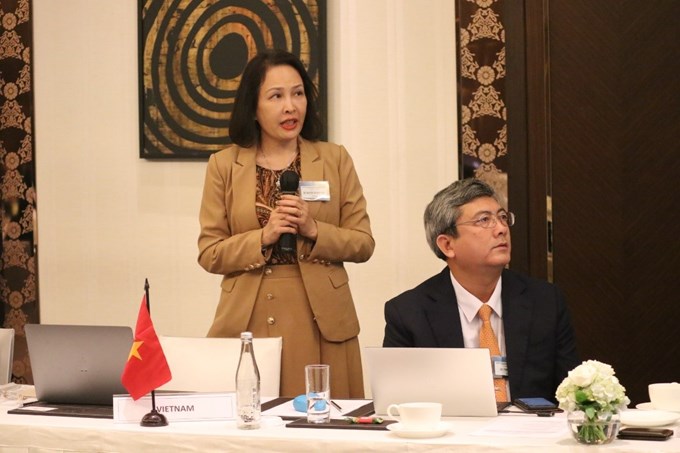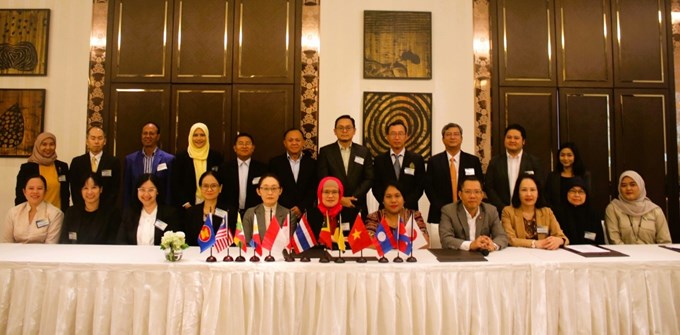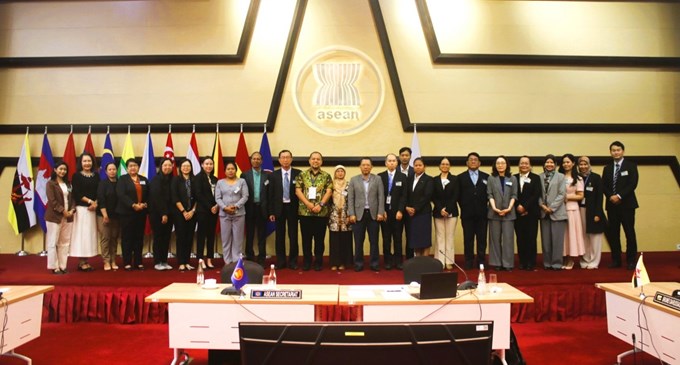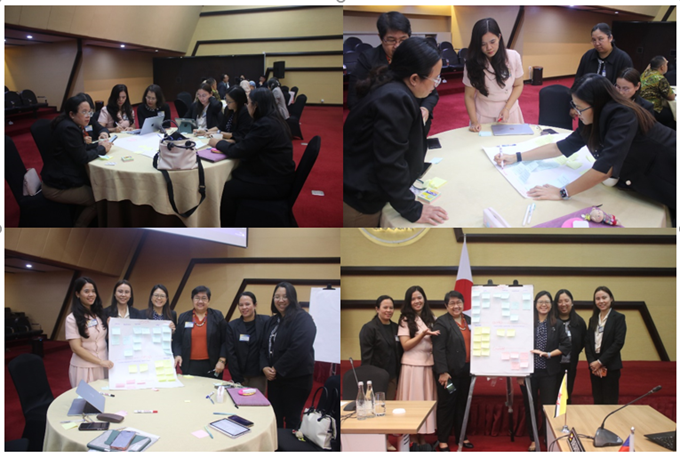With the support of the Ministry of Agriculture, Forestry and Fisheries of Japan (MAFF, Japan), the “Human Resources Development Project in the field of food through cooperation with universities in the ASEAN region – Phase 4” (Human Resources Development Project – Phase 4) continued to be vigorously implemented in 2025. The Project aims to enhance professional capacity for officials, lecturers, experts and managers in the areas of food value chains, food safety management and food analysis, thereby contributing to the development of a high-quality workforce that meets the requirements of regional integration in the agriculture and food sector in ASEAN.
On 18–19 November 2025, the Advisory Committee Meeting (ACM) of the Human Resources Development (HRD) Project was held in Jakarta, Indonesia, under the coordination of the ASEAN Secretariat, the Ministry of Agriculture, Forestry and Fisheries of Japan, with the participation of representatives from member universities and Ministries of Agriculture from countries in the region. Vietnam National University of Agriculture (VNUA) delegated Assoc. Prof. Dr. Nguyen Thi Bich Thuy and Dr. Phan Thi Phuong Thao to attend the meeting and contribute their views in sessions reviewing the implementation results of 2025 activities and proposing plans for the following year.
VNUA’s outstanding role in the HRD Project
For many years, VNUA has been one of the higher education institutions entrusted by the HRD Project to organize the largest number of training courses, including three key programs: Food Value Chain (FVC), Food Safety Management (FSM) and Food Analysis (FA). These training courses have attracted a large number of participants from government management agencies, universities, research institutes, enterprises and cooperatives across the country. The courses organized at VNUA have consistently received positive feedback thanks to their rich content, high practical relevance and modern teaching methods, which are well aligned with the development needs of the agriculture and food sector in the context of deep international integration.
Main contents of the ACM 2025 Advisory Committee Meeting
The first working day focused on reviewing the implementation of activities under the Food Value Chain component. The HRD Project Coordination Board presented a consolidated report on overall activities in 2025, followed by presentations from ASEAN member universities on the implementation results in each country.
At this session, Assoc. Prof. Dr. Nguyen Thi Bich Thuy reported on VNUA’s activities in 2025. Building on the success of previous training courses, VNUA was once again entrusted with organizing the FVC training course, one of the core components of the HRD Project. The course attracted nearly 200 participants from more than 40 universities and food enterprises nationwide. With a blended model that combined face-to-face and online training, the course ensured a high level of interaction and created favorable conditions for participants from all regions of the country to take part fully and actively. The course covered a wide range of in‑depth and highly practical topics, such as reducing food loss and protecting the environment; managing global food supply chains and logistics; technologies for producing dairy products; and intellectual property in agriculture. In particular, group activities and thematic seminars helped participants gain deeper understanding of key issues, engage in lively discussions, as well as assess the current situation and propose solutions for developing sustainable food value chains in Vietnam.
In addition to internal training activities, in September 2025 VNUA sent a delegation consisting of lecturers, Ph.D. students and under-graduate students to participate in a field study program on food value chains in Japan. The delegation visited and studied at leading agricultural and food enterprises in Osaka, Kyoto and Tokyo, where they observed first-hand advanced models of production organization, quality management and distribution of agricultural and food products in Japan.
Following the presentations, delegates discussed the work plan for 2026, with emphasis on further improving teaching quality, strengthening linkages among universities, expanding practical components and developing a set of common training materials for the entire network. The session concluded with the adoption of the report and the announcement of financial and reporting requirements of the Project.
The second working day was devoted to two other important areas of the Project: Food Safety Management and Food Analysis. In the FSM session, delegates focused on the challenges encountered by training institutions in the region when implementing advanced standards such as GMP, HACCP and JFSM, as well as the need for technical support related to Japan’s regulations on maximum residue limits (MRL) for imported agricultural products. In the FA session, the Coordination Board and member universities updated one another on the organization of training, the need to upgrade laboratory equipment and the standardization of analytical procedures to meet international requirements.
In the afternoon, the workshop “Shaping the Future of Food Standards in ASEAN” was held, providing a forum for ASEAN countries to share experience, engage in group discussions and receive feedback from MAFF Japan on directions for improving food standards in the region. VNUA’s representatives shared their experience in organizing FA and FSM training courses in Vietnam, particularly the integration of practical case studies from Vietnamese enterprises into the curriculum to enhance applicability.
During the working sessions, VNUA presented its annual activity report, highlighting positive results from the FVC, FSM and FA programs, and proposed expanding advanced and specialized training contents as well as increasing the involvement of Japanese experts in technically demanding topics. These proposals from VNUA were highly appreciated as they stem from Vietnam’s practical needs and are in line with the overall orientation of the Project.
Furthermore, VNUA expressed its strong commitment to closer cooperation with the HRD Coordination Board in 2026, especially in developing internationally benchmarked training programs, expanding learner outreach and contributing to ASEAN’s collective efforts to improve the quality of human resources in the agriculture and food sector.
Plans for the next year
The ACM 2025 Meeting reaffirmed the importance of cooperation in training between VNUA and the ASEAN – Japan HRD network. With its experience in organizing large‑scale training courses, VNUA aims to continue playing an active role in disseminating models, practical experience and lessons learned to the broader training community in the region. The University sets the goal of further enhancing the quality of training courses in 2026, promoting applied research and creating more opportunities for professional exchange between Vietnam and universities in ASEAN and Japan.
VNUA’s responsible and effective participation in this ACM has reaffirmed the University’s position within the HRD network, while opening up new prospects for cooperation to improve the quality of education and research in Vietnam’s agriculture and food sector.
Some photos from the meeting:

Assoc. Prof. Dr. Nguyen Thi Bich Thuy presenting the results of the FVC 2025 training course organized at VNUA.


Representatives of the ASEAN Secretariat, the Ministry of Agriculture, Forestry and Fisheries of Japan and 12 ASEAN countries attending the meeting.

VNUA representatives participating in a group discussion on the topic “Building international brands and promoting exports through Organic, GAP and GI certification”.
Faculty of Food Science and Technology